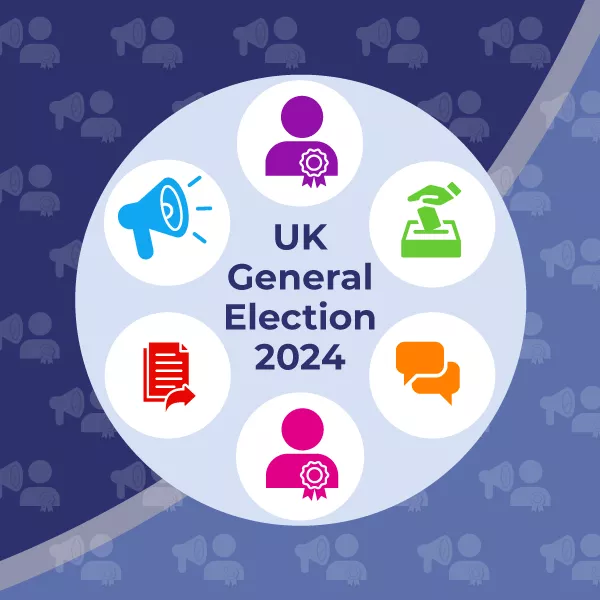
Decisions in Westminster may feel distant, but there’s no doubt conversations between Ministers, recommendations put forward by parliamentary committees or amendments passed by backbench MPs have an impact whether we realise or not.
I’d have kept a close eye on the UK General Election regardless, but my role as Vice-President for Policy means I’ve been deeply involved in how the College has prepared to ensure that whoever forms the next UK Government changes the way we do things on children’s health and wellbeing.
From attending one of the major Party Conferences last October to now,1 I’ve seen through my role how we’ve used our own manifesto to call on political parties to support children’s health and wellbeing by adopting policy recommendations under seven priority areas:
- Prioritise child health services.
- Support for the child health workforce.
- Harness the power of data.
- Promote the prevention of ill health.
- Address children's mental health.
- Strengthen child protection.
- Tackle climate change
Against the backdrop of this work we can point to some welcome signs of success following the publication of the three main political parties’ (in England) manifestos last week, outlined below.2 Following the election, we will be working hard on your behalf to raise the profile of child health and paediatrics, and ensure the positive commitments are taken forward and our concerns and amends are considered.
Conservatives
The Conservative Manifesto includes several commitments relevant to our work. On prevention, it is positive that the party has pledged to bring back the Tobacco and Vapes Bill which aims to eradicate smoking as well as a commitment to ban advertising of high fat, salt and sugar foods to tackle childhood obesity. The College is clear these measures are crucial to decrease the changes of children developing preventable diseases later in life. These sit alongside a promise to deliver a Family Hub in every local authority in England – the former Health Minister Andrea Leadsom’s answer to Sure Start.
On workforce, it is no surprise to see a pledge to recruit more nurses and doctors through the Long-Term Workforce Plan (LTWP) from the party that delivered it in government. RCPCH continues to call for the modelling that sits behind this plan to better reflect current and future demand for child health services.
On retention, the Conservative Party pledge to improve working conditions for all NHS staff, though the devil will be in the detail. A priority for whoever wins the next election will be to set out steps to address the wellbeing of NHS staff including by seeking a resolution to the junior doctor’s strike.
Elsewhere, the Conservative Manifesto goes into considerable detail on two pressing issues for the children and young people and paediatricians – mental health and gender dysphoria or incongruence. The party include the welcome aim to scale up mental health support teams in schools alongside several other policy initiatives. While on gender, the Conservatives pledge to bring forward legislation to ensure guidance for teachers on how best to support gender questioning students. The College has previously shared our concerns for the impact this might have on the wellbeing of gender questioning and trans children and their peers.
Labour
The Labour Manifesto makes a welcome pledge to raise the healthiest generation of children in our history with policies to do this set out in their Child Health Action Plan. We responded to the initial publication of this, and it is positive to see it has been integrated into the Labour manifesto.
The plan includes several recommendations from the College such as pledges to bring forward legislation to eradicate smoking, enable health visitors to deliver vaccinations, to introduce a supervised tooth brushing scheme in schools for young children, and restrict junk food marketing. We know that the window for making the greatest impact on health across the life course is in childhood, starting from pregnancy so these initial steps are positive to see.
More broadly, the party acknowledge the impact of poverty on child health pledging to develop a strategy to reduce child poverty. They also recognise the need to address health inequalities committing to enact the socioeconomic duty in the Equality Act 2010, which we have called for alongside a cross-government strategy to reduce health inequalities as members of the Inequalities in Health Alliance.
Like the Conservatives, Labour make a range of commitments on health services and the NHS workforce. Their Child Health Action Plan pledges to cut paediatric waiting times through a broader commitment to deliver 40,000 additional appointments a week. This is a welcome commitment, but we are clear that it must not be at the further expense of staff wellbeing,
Another positive for the College is the intention of Labour to improve data sharing across services with a single unique identifier, which we’ve argued could be transformative for child health if done right. Both the Labour Party and Conservatives also recognise the need to digitise the red book.
Liberal Democrats
Finally, the Liberal Democrat Manifesto centres around the theme of a fair deal and which has been dubbed as a plan to save the NHS. Within this, they include a welcome pledge for a 10-year plan to retain the hard-working staff currently in the NHS. There are also positive commitments to day-one rights to flexible working, expanded affordable childcare access, improved IT systems and investing in hospital premises can prove critical in creating an NHS which values its staff for the long-term.
The manifesto includes several child health and wellbeing specific policies, particularly on the prevention agenda and the rights of children for the best possible start in life. Policies we’ve called for that they commit to include a ban on disposable vapes, as well as policies on mental health, obesity, and air pollution.
They also have a strong emphasis on child poverty and are the only party currently committed to ending the two-child benefit cap which – based on overwhelming evidence – is the number one call for anti-child poverty campaigners including at RCPCH.
The Liberal Democrats also take an unequivocal child rights approach to their policy platform with a commitment to incorporate the UN Convention on the Rights of the Child into UK law, a pledge to scrap the Illegal Migration Act and the appointment of a Cabinet Level Minister for Children and Young people, a key pillar of the College’s manifesto.
Get involved
Make your voice heard. Alongside the manifestos, we want candidates from across the country and the political spectrum to make clear how they will prioritise children’s health in a changing world if elected to the Westminster Parliament. We’ve made it easy for you to ask your local candidates these questions through our e-action tool. [This is closed as of 1 July]
And don’t forget to vote! Polling day is Thursday 4 July, and you need photo ID to cast your ballot.
- 1In 2023 RCPCH attended the Labour and Conservative party conferences, and attends party conferences for parties across the four nations.
- 2RCPCH is a charitable organisation and as such we never endorse political parties or movements, and work with representatives of all parties equally. This analysis considers the three biggest political parties manifestos in England but we are researching and engaging with all political parties' policy platforms during this UK general election. Following the election, we will engage with MPs of all parties on evidence-based policy solutions to some of the most pressing problems facing the health service and child health.










